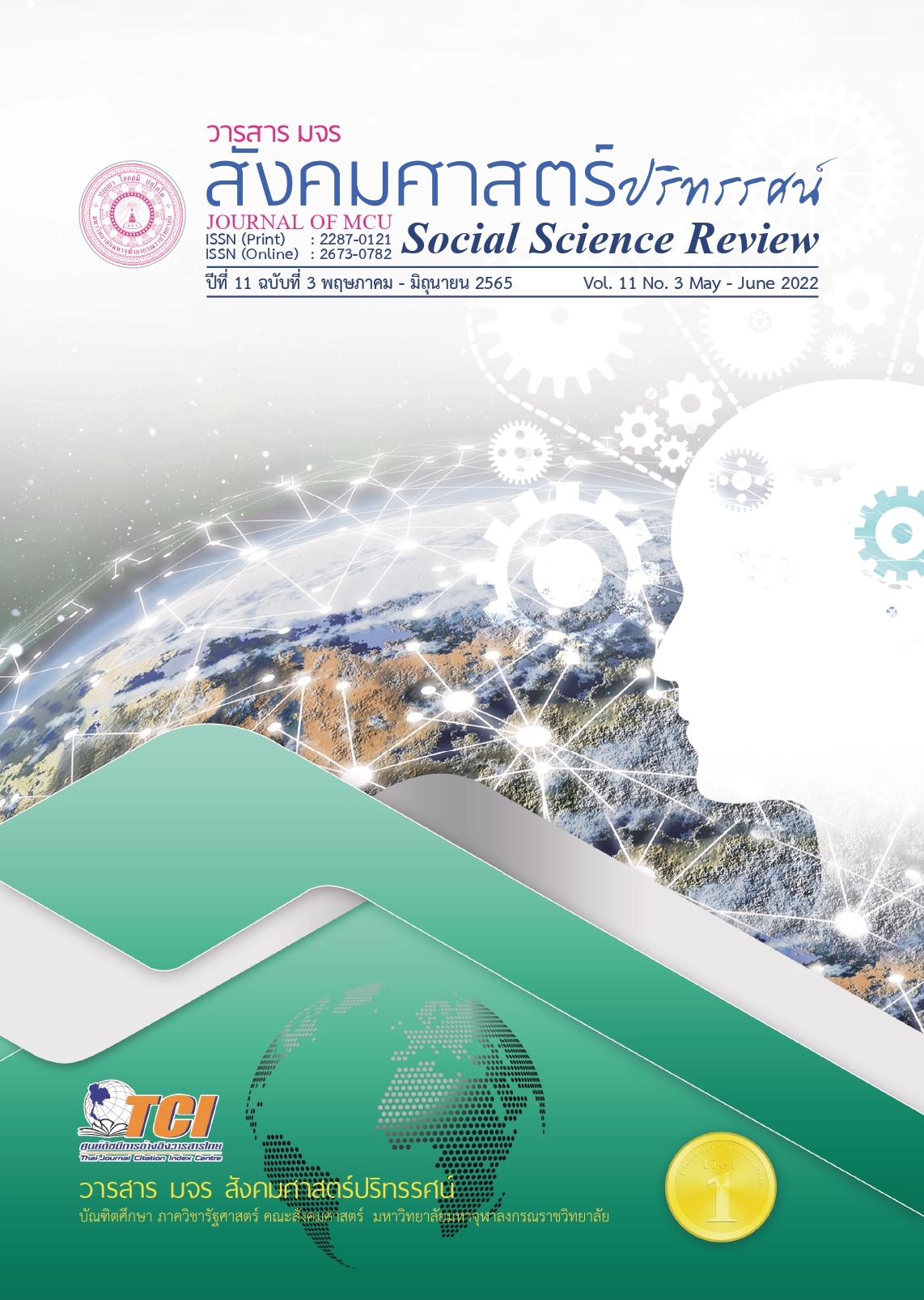ความพร้อมศักยภาพขององค์กรปกครองส่วนท้องถิ่นในการสนับสนุนเศรษฐกิจจากฐานรากตามแนวทางการปลูกสวนเศรษฐกิจ
คำสำคัญ:
ศักยภาพ, เศรษฐกิจฐานราก, การปลูกสวนเศรษฐกิจ, องค์กรปกครองส่วนท้องถิ่นบทคัดย่อ
บทความนี้มีวัตถุประสงค์เพื่อจัดอันดับขององค์กรปกครองส่วนท้องถิ่นในมิติของศักยภาพความพร้อมในการสนับสนุนเศรษฐกิจฐานรากตามแนวทางการปลูกสวนเศรษฐกิจ ใช้วิธีการสำรวจ แบบสอบถามในการเก็บข้อมูล หน่วยในการวิเคราะห์ใช้องค์กรปกครองส่วนท้องถิ่น มีผู้บริหารจาก 72 หน่วยงานเป็นผู้ให้ข้อมูลสำคัญ วิเคราะห์โดยสถิติเชิงพรรณนา ได้แก่ ค่าความถี่ ค่าสถิติร้อยละ และข้อมูลในส่วนของชุดคำถามด้านทัศนคติ การตระหนักรู้ถึงบทบาทหน้าที่ขององค์กรกับการดำเนินกิจกรรมสอดคล้องกับการส่งเสริมเศรษฐกิจฐานรากนำมาเรียงตามลำดับจากมากสุดไปน้อยสุด เพื่อแสดงอันดับศักยภาพ
ผลการวิจัยพบว่า องค์กรปกครองส่วนท้องถิ่นมีศักยภาพความพร้อมในการสนับสนุนเศรษฐกิจจากฐานราก จากความกระตือรือร้นและการตระหนักของผู้บริหารในบทบาทการเป็นผู้สนับสนุนการพัฒนาเศรษฐกิจจากฐานรากตามแนวทางการปลูกสวนเศรษฐกิจ และความพร้อมในด้านโครงสร้างพื้นฐานที่มีอยู่ ในการจัดอันดับศักยภาพความพร้อมการสนับสนุนเศรษฐกิจจากฐานรากตามแนวทางการปลูกสวนเศรษฐกิจ พบว่าใน 10 อันดับแรกประกอบด้วย องค์กรปกครองส่วนท้องถิ่นทั้ง 5 ประเภท และมีการกระจายตัวของหน่วยงานทั่วทั้ง 4 ภูมิภาคของประเทศไทยอย่างใกล้เคียงกัน แต่อย่างไรก็ตามเพื่อให้องค์กรปกครองส่วนท้องถิ่นสามารถดำเนินการสนับสนุนได้อย่างเต็มที่ จำเป็นต้องอาศัยกลไกและการขับเคลื่อนที่เหมาะสมในการปรับปรุงและการจัดการเกี่ยวกับนโยบาย ระเบียบ กฎหมาย และการสนับสนุนด้านงบประมาณ
เอกสารอ้างอิง
จรัส สุวรรณมาลา. (2558). การพัฒนาเศรษฐกิจท้องถิ่น บนเส้นทางการกระจายอำนาจของไทย. ในดุลอำนาจในการเมืองการปกครองไทย, วุฒิสาร ตันไชย, บก. กรุงเทพฯ : สถาบันพระปกเกล้า.
ชัยพัฒน์ พุฒซ้อน และกันตพัฒน์ พรศิริวัชรสิน. (2561). แนวทางการแก้ไขปัญหาสังคมผู้สูงอายุของประเทศไทย. วารสารเครือข่ายส่งเสริมการวิจัยทางมนุษยศาสตร์และสังคมศาสตร์, 1(1), 25-36.
ฐิตินาถ ภูมิถาวร. (2564). วิกฤติการณ์ของโลกในศตวรรษที่ 21: กรณีความยากจนและความเหลื่อมล้ำในสังคม. วารสารสังคมภิวัฒน์, 12(2), 68–85.
ธัญญพัทธ์ ภูริพินิศนันท์. (2565). การกระจายอำนาจกับการพัฒนาท้องถิ่นขององค์กรปกครองส่วนท้องถิ่นไทย. วารสาร มจร บาฬีศึกษาพุทธโฆสปริทรรศน์, 8(1), 85–100.
ธีรภัทร์ เศวตวงศ์ และพีรสิทธิ์ คํานวณศิลป์. (2564). ความสัมพันธ์ระหว่างความเป็นอิสระทางการคลังการตอบสนองความต้องการของประชาชน และความรับผิดชอบต่อการตัดสินใจขององค์กรปกครองส่วนท้องถิ่น. วารสารมหาวิทยาลัยมหามกุฏราชวิทยาลัย วิทยาเขตร้อยเอ็ด, 10(1), 599–611.
ศิกานต์ อิสสระชัยยศ. (2559). การพัฒนาเศรษฐกิจในท้องถิ่น: ประสบการณ์จากนานาชาติและทางเลือกเพื่อพัฒนาท้องถิ่นไทย. วารสารสถาบันพระปกเกล้า, 14(1), 72–98.
สามารถ ใจเตี้ย. (2562). การเสริมสร้างสุขภาพสังคมผู้สูงอายุในยุคไทยแลนด์ 4.0. วารสารวิชาการสาธารณสุข, 28(S2), S185–S194.
Barrios, S., & Barrios, D. (2004). Reconsidering economic development: the prospects for economic gardening. Public Administration Quarterly, 28(1/2), 70–101.
Bartik, T., & Erickcek, G. (2014). Simulating the Effects of the Tax Credit Program of the Michigan Economic Growth Authority on Job Creation and Fiscal Benefits. Economic Development Quarterly, 28(4), 314–327.
Bartik, T. J. (1991). Who benefits from state and local economic development policies? W.E. Upjohn Institute for Employment Research.
Lowe, N. J. (2014). Beyond the Deal: Using Industrial Recruitment as a Strategic Tool for Manufacturing Development. Economic Development Quarterly, 28(4), 287–299.
Lynch, R. G. (2004). Rethinking Growth Strategies: How State and Local Taxes and Services Affect Economic Development. Economic Policy Institute.
Seyfang, G., & Smith, A. (2007). Grassroots Innovations for Sustainable Development: Towards a new research and policy agenda. Environmental Politics, 16(4), 584–603.
Zumitzavan, V. (2020). Learning preferences and brand management in the Thai housing estate industry. International Journal of Management and Enterprise Development, 19(1), 42–57.
___________. (2022). Practical strategy for maintaining organisational performance in the hospitality industry of Thailand. International Journal of Management Practice, 15(1), 108–130.
ดาวน์โหลด
เผยแพร่แล้ว
รูปแบบการอ้างอิง
ฉบับ
ประเภทบทความ
สัญญาอนุญาต
ลิขสิทธิ์ (c) 2022 วารสาร มจร สังคมศาสตร์ปริทรรศน์

อนุญาตภายใต้เงื่อนไข Creative Commons Attribution-NonCommercial-NoDerivatives 4.0 International License.
เพื่อให้เป็นไปตามกฎหมายลิขสิทธิ์ ผู้นิพนธ์ทุกท่านต้องลงลายมือชื่อในแบบฟอร์มใบมอบลิขสิทธิ์บทความให้แก่วารสารฯ พร้อมกับบทความต้นฉบับที่ได้แก้ไขครั้งสุดท้าย นอกจากนี้ ผู้นิพนธ์ทุกท่านต้องยืนยันว่าบทความต้นฉบับที่ส่งมาตีพิมพ์นั้น ได้ส่งมาตีพิมพ์เฉพาะในวารสาร มจร สังคมศาสตร์ปริทรรศน์ เพียงแห่งเดียวเท่านั้น หากมีการใช้ภาพหรือตารางหรือเนื้อหาอื่นๆ ของผู้นิพนธ์อื่นที่ปรากฏในสิ่งตีพิมพ์อื่นมาแล้ว ผู้นิพนธ์ต้องขออนุญาตเจ้าของลิขสิทธิ์ก่อน พร้อมทั้งแสดงหนังสือที่ได้รับการยินยอมต่อบรรณาธิการ ก่อนที่บทความจะได้รับการตีพิมพ์ หากไม่เป็นไปตามข้อกำหนดเบื้องต้น ทางวารสารจะถอดบทความของท่านออกโดยไม่มีข้อยกเว้นใดๆ ทั้งสิ้น





